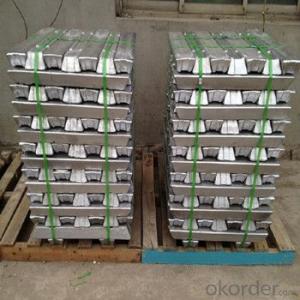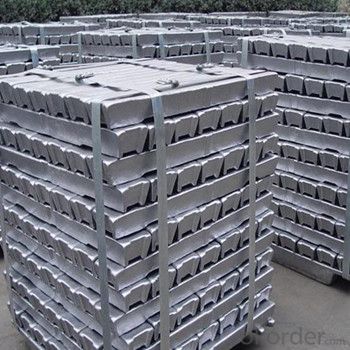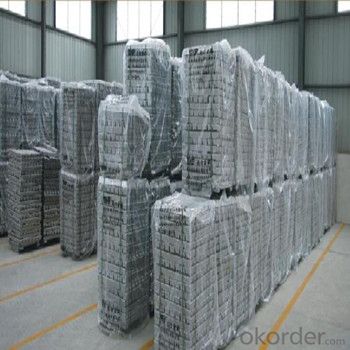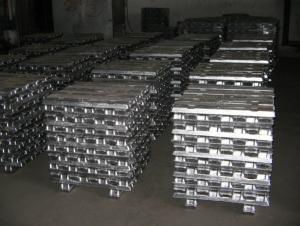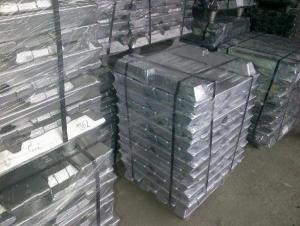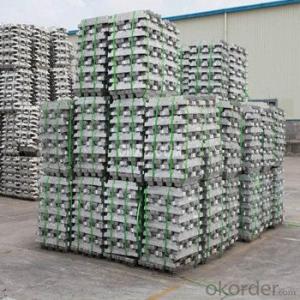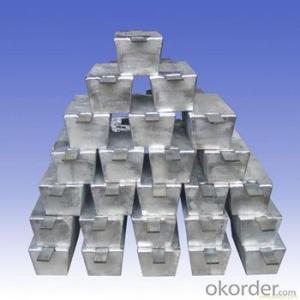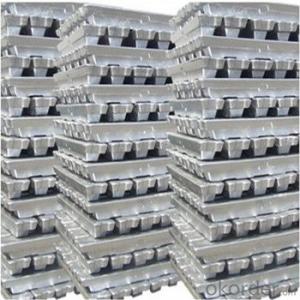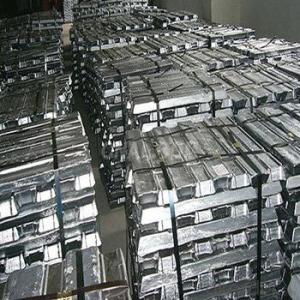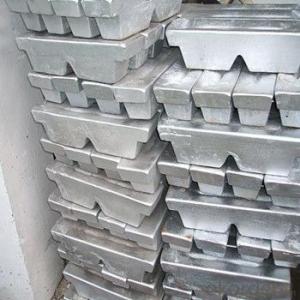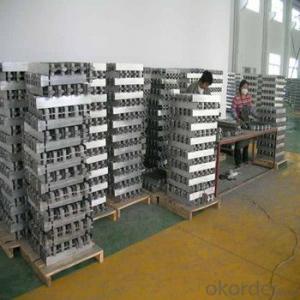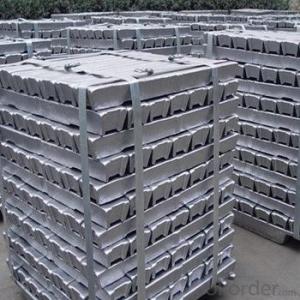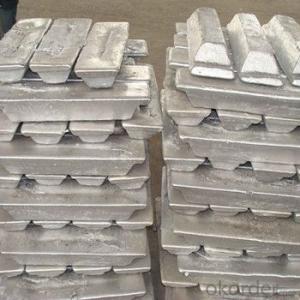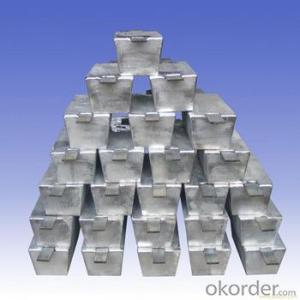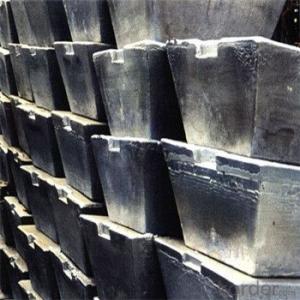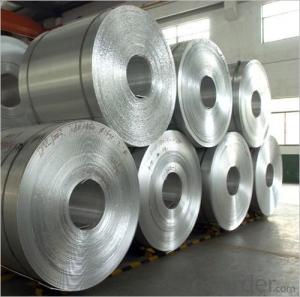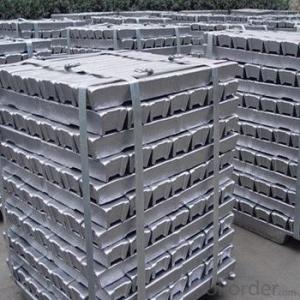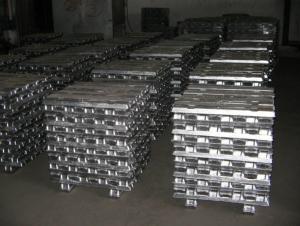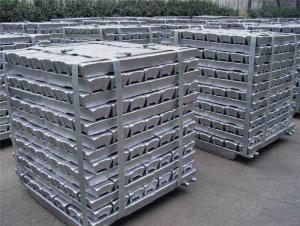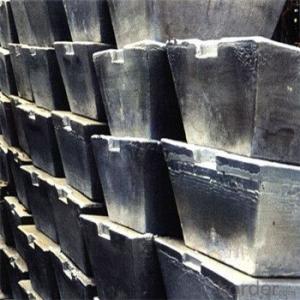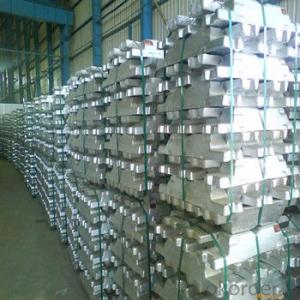Aluminum Pig/Ingot With Good Quality And Good Pirce
- Loading Port:
- China main port
- Payment Terms:
- TT OR LC
- Min Order Qty:
- 1000 m.t.
- Supply Capability:
- 100000 m.t./month
OKorder Service Pledge
OKorder Financial Service
You Might Also Like
Pure Aluminum Pig/Ingot Used for Industry
1.Structure of Aluminum Pig/Ingot
A material that has been cast into a shape in order to be transported and processed easier than in an unprocessed form. An ingot is typically rectangular in shape, which allows it to be stacked. Ingots are most commonly associated with metals, with ingots of gold held in the vaults of banks and brokerages being popular images.
Aluminum Ingot is with the AL as the main chemical composition.Aluminum Ingot is used for industry,such as automobile,pinning and weaving,electron broadly and so on. Aluminum Ingot has the following advantages: easy control and operation, fast melting.
2.Main Features of the Aluminum Pig/Ingot
•High Purity
•Easy control and operation
•High strength
•Fast melting
•Competitive price
•Best Service
3.Aluminum Pig/Ingot Images
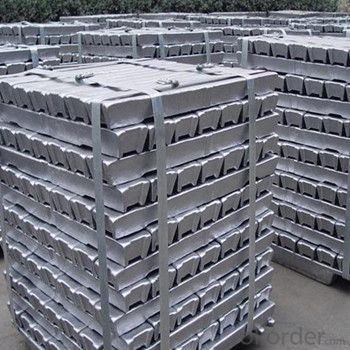
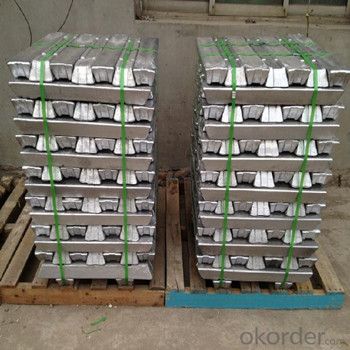
4.Aluminum Pig/Ingot Specification
Grade | Chemical Composition % | |||||||||
Al≥ | impurities ≤ | |||||||||
Si | Fe | Cu | Ga | Mg | Zn | Mn | others | Sum | ||
Al99.9 | 99.90 | 0.50 | 0.07 | 0.005 | 0.02 | 0.01 | 0.025 | - | 0.010 | 0.10 |
Al99.85 | 99.85 | 0.80 | 0.12 | 0.005 | 0.03 | 0.02 | 0.030 | - | 0.015 | 0.15 |
Al99.7 | 99.70 | 0.10 | 0.20 | 0.010 | 0.03 | 0.02 | 0.030 | - | 0.030 | 0.30 |
Al99.6 | 99.60 | 0.16 | 0.25 | 0.010 | 0.03 | 0.03 | 0.030 | - | 0.030 | 0.40 |
Al99.5 | 99.50 | 0.22 | 0.30 | 0.020 | 0.03 | 0.05 | 0.050 | - | 0.030 | 0.50 |
Al99.00 | 99.00 | 0.42 | 0.50 | 0.020 | 0.03 | 0.05 | 0.050 | - | 0.050 | 1.00 |
5.FAQ of Aluminum Pig/Ingot
We have organized several common questions for our clients,may help you sincerely:
①How about your company?
A professional factory which foucs on producing the aluminum pig,can meet customers' requiement to the quality and grade.The quality also have been accepted by customer.Already got the good reputation among the customers.It have gotten lot of much experience.The facrtory has the professional Technical Worker and the advanced equipments for production.Beside,it has the profesional teams to operate the whole proess for exporting.OEM service is availble and welcome.The items have beedn exported around the world,and have been acceptable among the customers,and have gotten the good reputation already.No matter from the quality,price and service,can be guaranteed for the cusgtomers.High purity and diffent grade are available.
②How to guarantee the quality of the products?
We have established the international advanced quality management system,every link from raw material to final product we have strict quality test;We resolutely put an end to unqualified products flowing into the market. At the same time, we will provide necessary follow-up service assurance.
③How long can we receive the prod rking days, We will arrange the factory delivery as soon as possible. The pecific time of receiving is related to the state and position of customers.Commonly 7 to 10 working days can be served.
- Q: Production process of aluminium ingot
- In the world has proven reserves of bauxite, 92% is weathering lateritic bauxite, belonging to gibbsite type bauxite. The characteristics of these is low silicon, high iron and high silicon aluminum ratio, concentrated in West Africa, Oceania and central and South america. The remaining 8% are sedimentary type bauxite, belong to diaspore and diaspore type, low grade, mainly in Greece, the former Yugoslavia and Hungary and other places.
- Q: Can aluminum ingots be customized for specific applications?
- Certainly, specific applications can have customized aluminum ingots. Aluminum, a remarkably adaptable metal, can be effortlessly shaped to fulfill diverse needs. Typically, the customization procedure includes combining the aluminum with other elements to amplify qualities like strength, hardness, resistance to corrosion, and thermal conductivity. Furthermore, the ingots can undergo various heat treatment methods such as annealing, quenching, and tempering to further adjust their properties. Consequently, aluminum ingots that are precisely designed for particular applications can be manufactured, encompassing a wide range from automotive parts and aerospace components to construction materials and consumer products.
- Q: What method does common smelting aluminium ingot adopt now?
- Only the electric stove, the stove is not expensive, the electricity price is relatively stable, melts one ton aluminum ingot, theoretically consumes 500 degrees, moreover the power consumption itself does not have the pollution, should be the first choice.
- Q: How are aluminum ingots used in the production of cookware?
- The unique properties of aluminum ingots are crucial in the production of cookware. These ingots are melted and shaped into various forms like pots, pans, and baking sheets. The excellent heat conductivity of aluminum makes it widely used in cookware production. Unlike other metals, aluminum efficiently conducts heat, ensuring even distribution across the entire cookware surface. This property guarantees consistent cooking results, preventing hotspots and reducing the risk of food burning or sticking. Furthermore, aluminum's lightweight and easy-to-handle nature make it a popular choice for cookware. This feature is especially beneficial for individuals with limited strength or mobility, enabling them to maneuver and lift cookware effortlessly. However, pure aluminum is relatively soft and prone to scratches and dents. To enhance its durability, aluminum ingots are often alloyed with other metals like copper or stainless steel during the manufacturing process. These alloys improve the strength and hardness of the cookware while maintaining the excellent heat conductivity of aluminum. Moreover, aluminum is non-reactive, meaning it does not interact with acidic or alkaline foods. This characteristic ensures that the taste and quality of the cooked food are unaffected by the cookware material. Additionally, aluminum cookware is generally affordable, making it accessible to a wide range of consumers. Its cost-effectiveness, combined with its excellent cooking performance, has made aluminum cookware a staple in kitchens worldwide. In conclusion, the excellent heat conductivity, lightweight nature, and non-reactive properties of aluminum ingots make them indispensable in cookware production. By utilizing aluminum ingots, manufacturers can create cookware that provides even heat distribution, durability, and affordability, enhancing the cooking experience for consumers.
- Q: How are aluminum ingots used in the production of household appliances?
- Aluminum ingots are used in the production of household appliances as they can be easily molded into various shapes and sizes. They are commonly used to make the outer casings and frames of appliances such as refrigerators, ovens, and washing machines due to their lightweight, durable, and corrosion-resistant properties. Additionally, aluminum ingots are also used in the production of heat sinks and electrical components within appliances to dissipate heat efficiently and ensure optimal performance.
- Q: Wall aluminum window price
- Aluminum profile is not expensive in general. I think the price of aluminum is more affordable.
- Q: How can the safety measures in aluminum ingot production be enhanced?
- There are several ways in which the safety measures in aluminum ingot production can be enhanced: 1. Implementing proper training programs: Providing comprehensive training to all employees involved in the production process is crucial. This includes training on the proper handling of equipment, understanding potential hazards, and following safety protocols. 2. Regular safety inspections: Conducting routine inspections of the production area can help identify potential safety hazards. This involves checking equipment for any wear and tear, ensuring proper ventilation, and identifying any potential sources of fire or chemical hazards. 3. Personal protective equipment (PPE): Ensuring that all workers have access to and are properly trained in using appropriate PPE is essential. This may include safety goggles, gloves, helmets, and protective clothing to prevent accidents and exposure to hazardous materials. 4. Hazard communication: Implementing a robust hazard communication program is crucial to inform workers about potential risks associated with aluminum ingot production. This includes labeling hazardous materials, providing safety data sheets, and conducting regular safety meetings to keep workers informed about any updates or changes in safety procedures. 5. Emergency response plans: Developing and practicing emergency response plans is vital to mitigate risks. This involves having clearly defined evacuation routes, establishing communication protocols during emergencies, and training workers on how to respond to different types of emergencies, such as fires or chemical spills. 6. Regular maintenance and equipment checks: Ensuring that all equipment used in the production process is regularly maintained and serviced can help prevent equipment malfunctions and potential accidents. Regular checks and maintenance should include inspecting electrical systems, machinery, and other equipment for any signs of damage or wear. 7. Continuous improvement and monitoring: Encouraging a culture of continuous improvement and monitoring is essential for identifying and addressing any safety concerns. This can involve regular safety audits, soliciting feedback from employees, and implementing necessary changes to improve safety measures. By implementing these measures, the safety in aluminum ingot production can be significantly enhanced, minimizing the risk of accidents, injuries, and potential hazards.
- Q: What quality aluminium ingots can be made out of pop cans?
- The quality shouldn't be very good. I just heard the saying: recycle a ton of pop top cans, and you can cut down 2 tons of aluminum ore
- Q: What are the different joining techniques for aluminum ingots?
- Different joining techniques can be utilized for aluminum ingots depending on their specific requirements and applications. Some commonly used methods for joining aluminum ingots are as follows: 1. Welding: The most frequently employed technique for joining aluminum ingots is welding. Various welding methods, such as gas metal arc welding (GMAW), tungsten inert gas welding (TIG), and friction stir welding (FSW), can be utilized. Welding involves melting the aluminum material and joining it together either with or without a filler metal. 2. Brazing: This technique involves joining aluminum ingots using a filler material with a lower melting point than the base metal. The filler material is heated above its melting point and distributed between the aluminum ingots, resulting in a strong bond as it solidifies. Brazing is commonly used when joining aluminum parts with complex geometries or when a lower heat input is required. 3. Adhesive bonding: This method involves using specialized adhesives to join aluminum ingots. Adhesive bonding is an efficient and cost-effective technique that does not require high temperatures or specialized equipment. It can create durable and robust bonds, particularly when combined with surface preparation techniques such as cleaning and roughening. 4. Mechanical fastening: This technique involves joining aluminum ingots using mechanical fasteners like screws, bolts, rivets, or nuts and bolts. Mechanical fastening is a relatively simple and cost-effective method that does not require any specialized equipment or high temperatures. It provides a strong and reliable joint, particularly when combined with techniques like pre-drilling or using threaded inserts. 5. Friction stir processing: This technique is a variation of friction stir welding. It employs a rotating tool to generate heat and friction, transforming the aluminum ingots into a semi-solid state. This process can improve the grain structure and mechanical properties of the joint, making it suitable for applications requiring enhanced strength or fatigue resistance. When selecting the appropriate joining technique for aluminum ingots, it is crucial to consider specific requirements, constraints, and desired properties. Factors such as joint strength, cost, time, and the availability of equipment and expertise should all be taken into account to ensure the most suitable joining method is employed.
- Q: How can the sustainability practices in aluminum ingot production be enhanced?
- There are several ways in which the sustainability practices in aluminum ingot production can be enhanced. Firstly, the adoption of cleaner and more energy-efficient technologies can greatly reduce the environmental impact of the production process. This could involve the use of renewable energy sources, such as solar or wind power, to power the production facilities. Upgrading equipment and machinery to more energy-efficient models can also help minimize energy consumption and reduce greenhouse gas emissions. Secondly, optimizing the recycling and reuse of aluminum scrap and waste materials can significantly reduce the need for virgin aluminum production. Implementing effective recycling programs and investing in advanced recycling technologies can ensure that a higher percentage of aluminum is recovered from end-of-life products and incorporated back into the production process. This not only conserves valuable resources but also reduces the energy-intensive extraction and refining processes associated with primary aluminum production. Thirdly, improving water management practices can contribute to enhanced sustainability in aluminum ingot production. Implementing efficient water conservation measures, such as recycling and reusing water within the production process, can help minimize water consumption. Additionally, implementing wastewater treatment systems to remove pollutants and contaminants from the discharged water can prevent water pollution and protect local ecosystems. Furthermore, promoting transparency and responsible sourcing practices in the supply chain can enhance sustainability in aluminum ingot production. This includes ensuring that the raw materials used in the production process, such as bauxite and alumina, are sourced from responsible and sustainable mining practices. Implementing traceability systems and certification programs can help verify the origin and sustainability of these materials, ensuring compliance with ethical and environmental standards. Lastly, engaging with stakeholders, including employees, local communities, and industry associations, can foster a culture of sustainability and drive continuous improvement in aluminum ingot production. This can involve regular training and awareness programs on sustainable practices, as well as collaborating with suppliers and customers to identify and implement innovative sustainability solutions. Overall, enhancing sustainability practices in aluminum ingot production requires a holistic approach that combines technological advancements, efficient resource management, responsible sourcing, and stakeholder engagement. By implementing these measures, the aluminum industry can minimize its environmental footprint and contribute to a more sustainable future.
Send your message to us
Aluminum Pig/Ingot With Good Quality And Good Pirce
- Loading Port:
- China main port
- Payment Terms:
- TT OR LC
- Min Order Qty:
- 1000 m.t.
- Supply Capability:
- 100000 m.t./month
OKorder Service Pledge
OKorder Financial Service
Similar products
Hot products
Hot Searches
